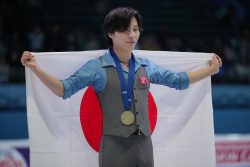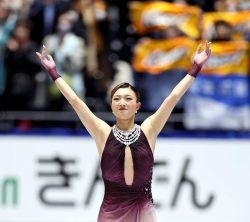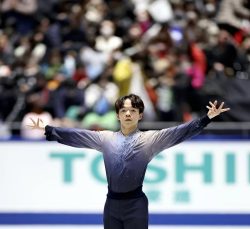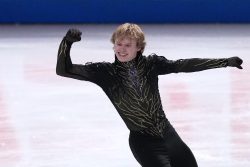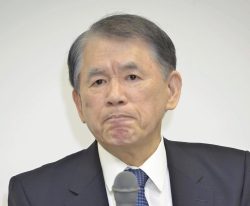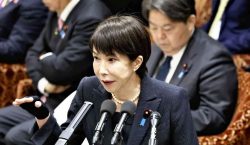Figure Skater Valieva Disqualified in Olympic Doping Case. Russians Set to Lose Team Gold to US
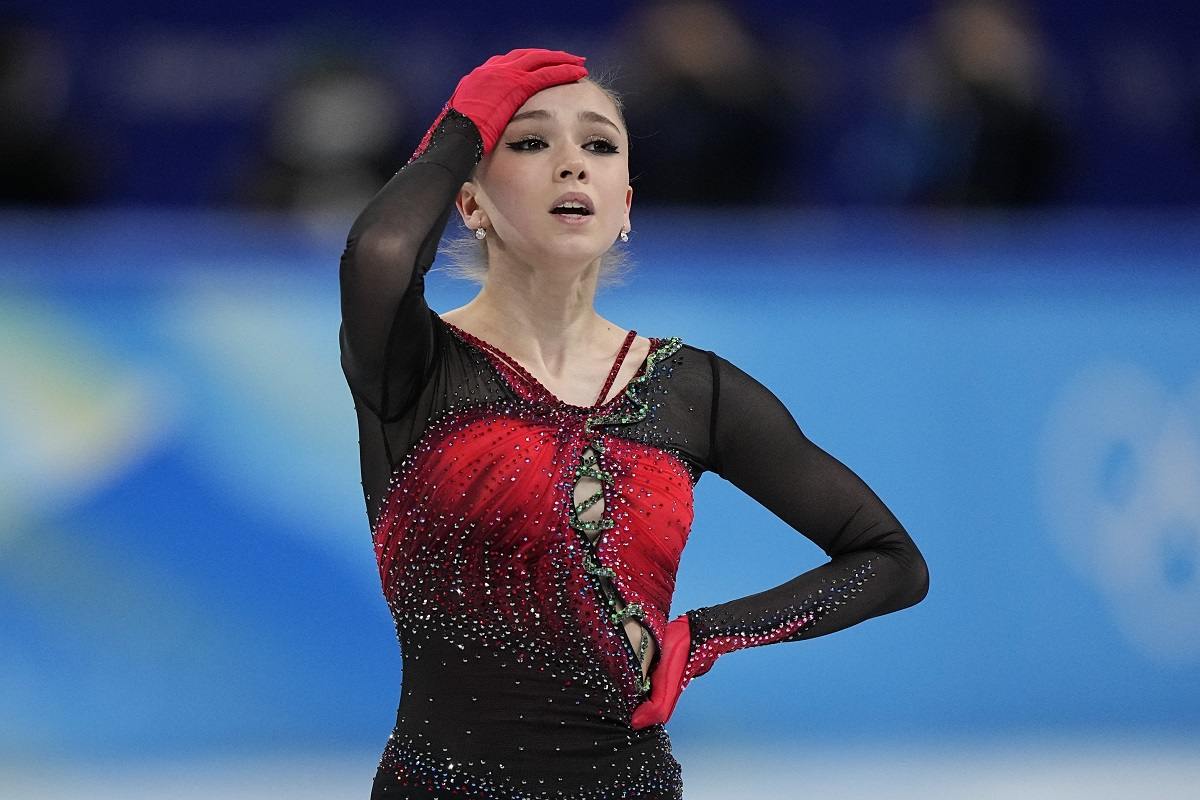
Kamila Valieva, of the Russian Olympic Committee, reacts in the women’s team free skate program during the figure skating competition at the 2022 Winter Olympics, Monday, Feb. 7, 2022, in Beijing.
10:32 JST, January 30, 2024
GENEVA (AP) — Russian figure skater Kamila Valieva was disqualified from the 2022 Olympics on Monday, almost two years after the teenager’s doping case caused turmoil at the Beijing Games, clearing the way for the United States to get the gold medal in the team event.
The verdict from the Court of Arbitration for Sport means the Russians are set to be stripped of the Olympic title. The American skaters are expected to soon be named Olympic champions after finishing second in Beijing.
The International Olympic Committee decided against having a trophy ceremony in Beijing, where the then-15-year-old Valieva was the star performer hours before her positive test for a banned heart medicine was revealed.
The case provoked legal chaos at the Beijing Olympics because Valieva’s sample, taken six weeks earlier at the Russian championships, was not notified as a positive test until Feb. 7, 2022, by a laboratory in Sweden which had staffing issues during the COVID-19 pandemic.
CAS upheld appeals led by the World Anti-Doping Agency, which asked the court to disqualify Valieva from the Olympics and ban her. A Russian sports tribunal had cleared her of any blame, citing that she was a minor.
The court banned her for four years, until Dec. 25, 2025 — about seven weeks before the next Winter Olympics in Milan and Cortina d’Ampezzo, Italy.
The IOC, which did not immediately comment on Monday, is responsible for reallocating medals and its executive board is next scheduled to meet in March. The Russians easily won the team event but will drop in the standings without Valieva’s points. Behind the U.S., Japan took bronze and Canada placed fourth.
“We now anticipate the day when we can wholeheartedly celebrate these athletes, along with their peers from around the world,” the U.S. Olympic body’s CEO, Sarah Hirshland, said in a statement Monday.
The likely new Olympic champions are Evan Bates, Karen Chen, Nathan Chen, Madison Chock, Zachary Donohue, Brandon Frazier, Madison Hubbell, Alexa Knierim and Vincent Zhou.
The International Skating Union said it welcomed the ruling and would comment Tuesday on the consequences. Those include amending results of the two Olympic competitions Valieva took part in.
In Moscow, Kremlin spokesman Dmitry Peskov criticized the ruling.
“Of course, we don’t agree with this. From my point of view, of course, it’s politicized,” Peskov said.
Valieva’s legal team said it was reviewing the CAS decision before deciding whether to appeal to the Swiss supreme court, lawyer Andrea Pinna said in a statement. Pinna, who is based in Paris, led the skater’s defense at the appeal hearings in September and November.
Appeals to the Swiss supreme court can be made on narrow procedural grounds, not the merits of the case.
Valieva’s lawyers argued she was contaminated by traces of the trimetazidine medication they said her grandfather used. She also was taking two oxygen-boosting substances that are not banned in sports.
“Having carefully considered all the evidence put before it,” the court said in a statement, “the CAS panel concluded that Ms. Valieva was not able to establish, on the balance of probabilities and on the basis of the evidence before the panel, that she had not committed the (doping violation) intentionally.”
The judges decided that, according to Russian anti-doping rules, Valieva could not benefit from having been a minor at the time of the positive test.
There was “no basis under the rules to treat them any differently from an adult athlete,” said the court, which did not publish its detailed verdict pending a review of confidentiality issues.
Valieva was able to continue to skate at the Olympics after rulings by a Russian tribunal and a separate CAS panel in Beijing did not hold her responsible because she was a minor.
The intense scrutiny on Valieva led to an error-filled skate in the individual event, where she was favored for gold but dropped to fourth place.
The drama continued when she left the ice. The reaction of her coach, Eteri Tutberidze, was fiercely criticized by skating experts and International Olympic Committee president Thomas Bach.
Bach said in Beijing one day later he was “very, very disturbed” to watch the “tremendous coldness” of Valieva’s entourage.
At that news conference, Bach gave an untypically direct reply apportioning blame when a Russian journalist seemed to suggest Olympic authorities and global media were bullying a 15-year-old.
“The ones who have administered this drug in her body, these are the ones who are guilty,” the IOC president said in Beijing.
World anti-doping rules require investigations of an entourage when an athlete 16 or younger tests positive. Both the Russian anti-doping body and WADA were expected to look into the case but neither has published any findings and there is no indication anyone else is facing anti-doping charges in the case.
“The doping of children is unforgivable,” the Montreal-based WADA said Monday. “Doctors, coaches or other support personnel who are found to have provided performance-enhancing substances to minors should face the full force of the world anti-doping code.”
The appeal case came to CAS to challenge a Russian anti-doping tribunal verdict in late 2022 that Valieva was not at fault. That ruling suggested disqualifying her only from the national championships and letting her keep her Olympic results and gold medal.
WADA asked CAS to impose a four-year ban and to disqualify Valieva from the Olympics. The ISU requested a two-year ban and disqualification.
“WADA took this appeal to CAS in the interests of fairness for athletes and clean sport and we believe that has been delivered through this decision,” the agency said.
Valieva, who turns 18 in April, has not competed internationally since the Beijing Olympics.
Four days after the closing ceremony, Russia launched its full-scale invasion of Ukraine, and five days after that, the ISU banned Russian skaters from its events. That ban is still in place.
Since the Olympics, Valieva has skated on an expanded Russian national competition circuit and in various TV events and ice shows. She is no longer the near-unbeatable skater she appeared to be before the Beijing Olympics and has twice been beaten at the Russian nationals by younger skaters from the same training group under Tutberidze.
Although scores at nationals are often inflated, Valieva’s 237.99 points — third at the Russia championships — would have been the best in the world by more than 10 points this season.
American ice dancer Evan Bates said this past weekend at the national championships that getting a team medal with partner Madison Chock will be meaningful to them.
“We’re the only two athletes from the Beijing team that are still competing — every single one of the rest of us has moved on,” Bates said. “Two years is too long that it’s taken for this decision to be made. We’re just looking forward to getting some closure.”
Top Articles in Sports
-

Milano Cortina 2026: Figure Skaters Riku Miura, Ryuichi Kihara Pair Win Gold; Dramatic Comeback from 5th Place in SP
-

Milano Cortina 2026: Japanese Gold Medalist Figure Skater Miura Says When Kihara Retires ‘I Retire Too’
-
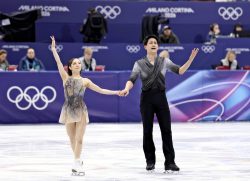
Milano Cortina 2026: Riku Miura, Ryuichi Kihara Clinch Japan’s 1st Gold in Pairs Figure Skating, Rebounding from Disappointing Short Program
-

Milano Cortina 2026: Kokomo Murase Comes Out on Top After Overcoming Obstacles, Aiming for Greater Heights in Competition
-

Milano Cortina 2026: Japan’s Mari Fukada Wins Gold in Women’s Snowboard Slopestyle; Japan’s Kokomo Murase in Bronze
JN ACCESS RANKING
-

Producer Behind Pop Group XG Arrested for Cocaine Possession
-

Japan PM Takaichi’s Cabinet Resigns en Masse
-

Man Infected with Measles Reportedly Dined at Restaurant in Tokyo Station
-

Israeli Ambassador to Japan Speaks about Japan’s Role in the Reconstruction of Gaza
-

Videos Plagiarized, Reposted with False Subtitles Claiming ‘Ryukyu Belongs to China’; Anti-China False Information Also Posted in Japan


